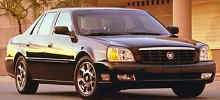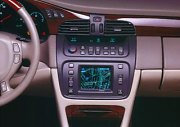|
 Deville
is the last breed of American extra-large luxurious sedan alongside
Lincoln
Town Car. However, the latest Deville, which launched in 1999, is a
completely
different vehicle. Based on GM’s G-platform sharing with Oldsmobile
Aurora,
Pontiac Bonneville, Buick LeSabre, Buick Park Avenue and Cadillac
Seville,
the Deville is no longer that old fashion long car. Everything is
modernized
such that there is hardly any trace of the old car.... excluding the
styling. Deville
is the last breed of American extra-large luxurious sedan alongside
Lincoln
Town Car. However, the latest Deville, which launched in 1999, is a
completely
different vehicle. Based on GM’s G-platform sharing with Oldsmobile
Aurora,
Pontiac Bonneville, Buick LeSabre, Buick Park Avenue and Cadillac
Seville,
the Deville is no longer that old fashion long car. Everything is
modernized
such that there is hardly any trace of the old car.... excluding the
styling.
Obviously,
Cadillac wants
to keep the old customers loyal to Deville, so the exterior design
remains
very conservative, very boxy and have long overhangs. I’d rather prefer
the styling of the outgoing Deville, at least every inch of its body
conforms
to the honest, straightforward design theme. In contrast, the new
Deville’s
body is basically boxy, but the irregular-shaped headlights and
slightly
curvy grille / front bumper cannot match the rest of the car. As a
result,
the front end looks odd.
Styling aside,
the Deville
is vastly improved from the previous one. Admittedly, I have no respect
at all for the old Deville. It’s so mechanically outdated that people
outside
the States saw it as a stone-age Dinosaur. Therefore, unlike the
American
journalists, I’m not going to focus on how much improvement the new car
has made and then praise it like jewel of the crown. Instead, let us
see
it in a global view point.
 Unlike
the more European-feel Seville, the Deville is constructed directly on
a stretched G-platform with the same semi-trailing arm rear suspension.
World standard it may not be, but at least it is rigid enough to
prevent
chassis flex. In dimensions, it is the second largest American sedan
(just
shadowed by Town Car), with an overall length of 5258 mm, that is, 100
mm longer than a long-wheelbase Mercedes S-class ! On the other hand,
its
2929 mm wheelbase is, although already longer than other G-platform
derivatives,
shorter than even a standard S-class (2965 mm). You can see the
Cadillac
still doesn’t use space very efficiently. Unlike
the more European-feel Seville, the Deville is constructed directly on
a stretched G-platform with the same semi-trailing arm rear suspension.
World standard it may not be, but at least it is rigid enough to
prevent
chassis flex. In dimensions, it is the second largest American sedan
(just
shadowed by Town Car), with an overall length of 5258 mm, that is, 100
mm longer than a long-wheelbase Mercedes S-class ! On the other hand,
its
2929 mm wheelbase is, although already longer than other G-platform
derivatives,
shorter than even a standard S-class (2965 mm). You can see the
Cadillac
still doesn’t use space very efficiently.
Deville
isn’t a
very dynamic
car, despite of the powerful Northstar V8. Long overhangs,
front-wheel-drive
and heavy nose create fundamental problems for handling, say, lack of
agility,
understeer, so-so steering feel and torque steer under full throttle,
that
is not the StabiliTrak electronic stability control can overcome.
American
journalists praised its handling mostly because they had not prepared
to
see the new Deville improved so much from the old car, yet they
admitted
it is not as driver-biased as the Seville. In fact, the Seville doesn’t
qualified as a driver’s car in European point of view, so you can see
why
the Deville is not exported.
While
the
standard and DLS
model feels lack of body control, the sportier DTS model with its
stiffer
suspension setup feels unsettled over rough surfaces that Mercedes and
BMW can overcome with ease. Here, the semi-trailing arm suspension is
the
one to be blamed. It could be worse without the adaptive damping, which
was borrowed from Seville.
Power,
however,
is not short
of. The 4.6-litre Northstar V8 produces 300hp under the bonnet of DTS
or
275hp for lesser models, giving it a performance matching BMW 740i, if
not Lexus LS400 or Audi A8.
 The
interior of Deville looks much more modernised than the exterior. It
looks
like a Seville, with similar fluorescent back-lit gauges,
ergonomically-positioned
controls, adaptive seats and excellent Bose sound system, but it has
more
room. DTS model has a console-mounted shifter instead of column shifter
to please those love driving. There are some equipment unique to the
Deville,
such as massager-fitted front seats, ultrasonic parking sensor and
Night
Vision system. The latter is a world first for automotive industry. It
was developed from military technology, using infrared camera at the
front
grille to scan the road far beyond the reach of headlights, then
project
the image to the Head-Up Display (that is, a virtual image on the
windscreen).
This enhances night vision very much because infrared has a longer
range
than headlights. The
interior of Deville looks much more modernised than the exterior. It
looks
like a Seville, with similar fluorescent back-lit gauges,
ergonomically-positioned
controls, adaptive seats and excellent Bose sound system, but it has
more
room. DTS model has a console-mounted shifter instead of column shifter
to please those love driving. There are some equipment unique to the
Deville,
such as massager-fitted front seats, ultrasonic parking sensor and
Night
Vision system. The latter is a world first for automotive industry. It
was developed from military technology, using infrared camera at the
front
grille to scan the road far beyond the reach of headlights, then
project
the image to the Head-Up Display (that is, a virtual image on the
windscreen).
This enhances night vision very much because infrared has a longer
range
than headlights.
As
seen, the
Deville has
even more electronic gadgets than the Seville, but I’d rather have a
simple
but fundamentally healthy car. |